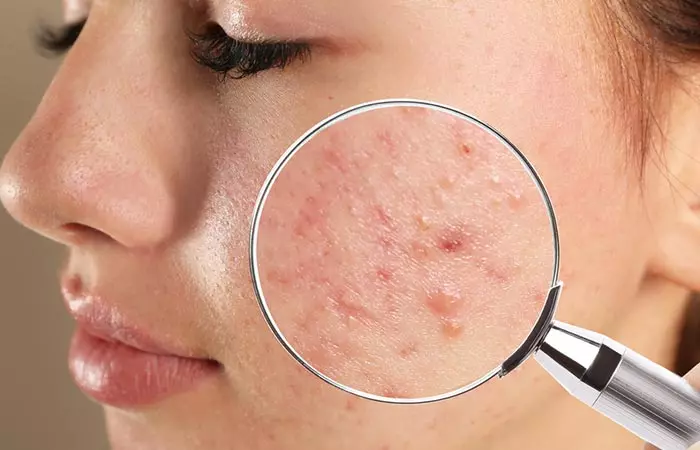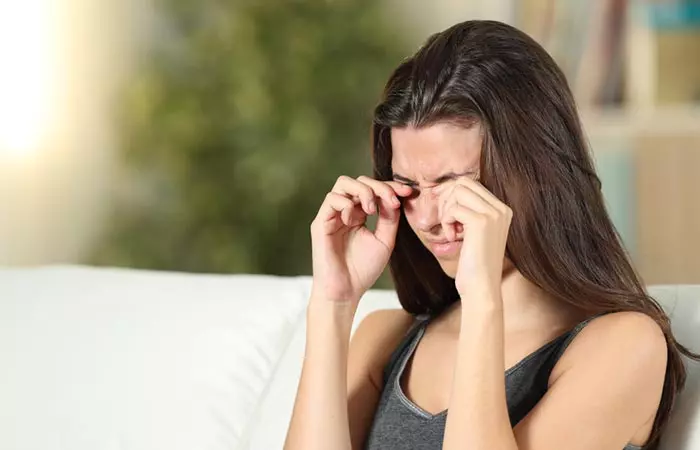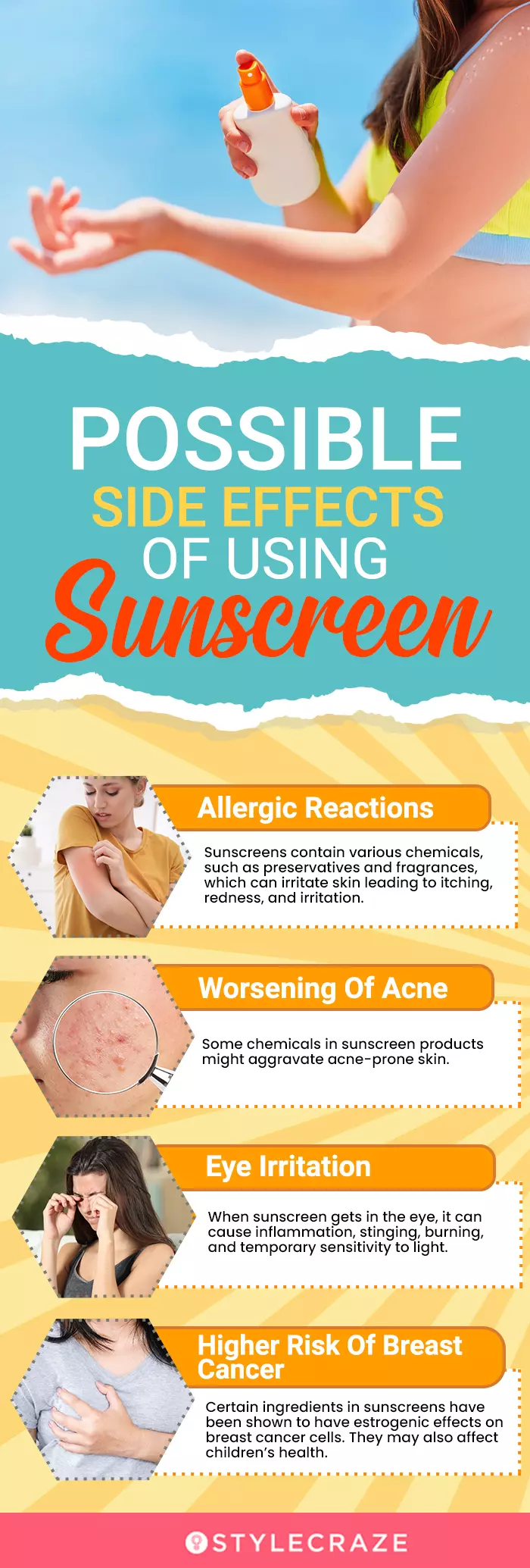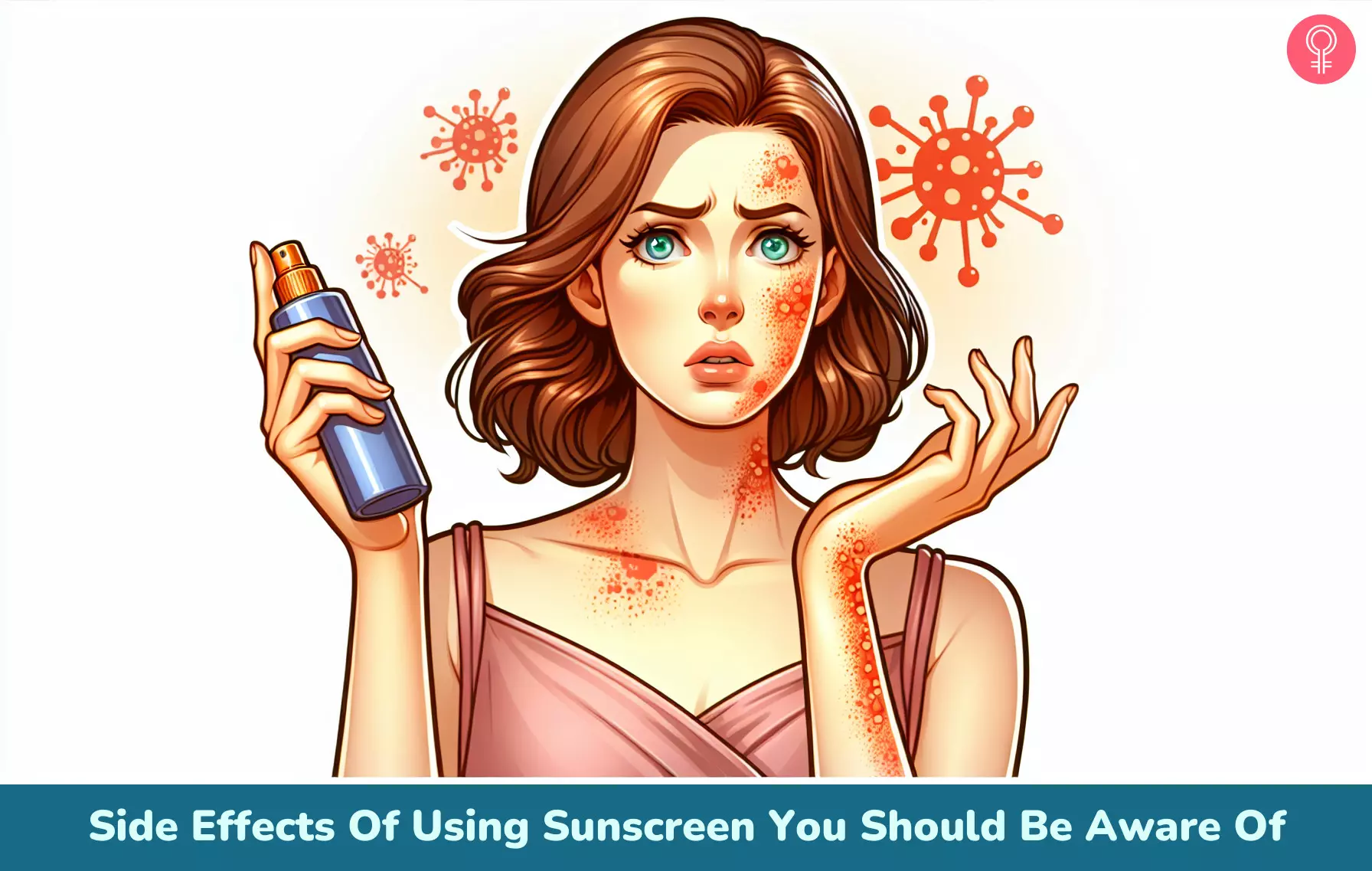How to Use Sunscreen:
Side Effects of Sunscreen
Learning how to choose sunscreen is as crucial as understanding the side effect. Here are some of the common side effects of sunscreen:
1. Allergic Reactions
Sunscreens include some chemicals that can cause skin irritation such as redness, swelling, dryness, irritation, peeling of the skin, and itching. Some people develop severe allergic reactions with rashes and intense itching. This allergic reaction can be the result of chemicals found in sunscreens like fragrances and preservatives. PABAi An organic compound that is used to generate vitamin B9 (folic acid) and treat certain autoimmune diseases. is ideally used in many commercial sunscreens that can cause a high rate of allergic reactions. Hence, this is getting removed from many popular sunscreens of reputed brands(1), (2). You can even buy sunscreens with the label ‘hypoallergenic’. Sunscreens that don’t contain PABA are often labeled, but some other chemicals can lead to an allergic problem (3). If you are not sure about the allergic reaction that may be caused by a sunscreen product, get a patch test done by a dermatologist. You can use sunscreens that contain zinc oxide, as they are less allergic.
2. Sunscreens Can Make Acne Worse
Do you have acne-prone skin or are you wondering, does sunscreen cause acne? Some chemicals in the sunscreen product can worsen your problem. To get rid of this side effect of sunscreen, you can choose non-comedogenici The property of a skin product that doesn’t clog your pores or lead to breakouts while allowing the skin to breathe. and non-oily sunscreens. It is suggested to use a sunscreen best suited for your skin type. Avoid using body sunscreens on the face, as these are too heavy (4).
3. Eye Irritation
Getting sunscreen into the eye can cause pain and irritation. This can also lead to burning and temporary sensitivity to light. Some claim that chemical sunscreens can also cause blindness. If the sunscreen gets into the eyes, rinse them thoroughly with cool water or see your doctor (5).
4. Increases The Risk Of Breast Cancer
Sunscreen includes ingredients that can have estrogenic effectsi The effect of the hormone estrogen, which can act as a catalyst in the cancerous mutation of healthy cells and help them multiply and spread. on breast cancer cells. Some sunscreens can have effects on blood estrogens levels. Avoid using chemical sunscreens on your children, as their skin tends to absorb the chemicals instantly (6). Benzophenone-3 is a common ingredient found in chemical sunscreens. It increases tumor cell proliferation and promotes breast cancer. A study conducted on mice showed that the use of BP-3 increased the proportion of epithelial tumors in mice that were fed an adult-restricted diet high in saturated animal fat (HFD).
Bp 3 Treatment Increased Tumor Proliferation
5. Pain in Hairy Areas
There are varieties of sunscreen that can be confusing to choose from. They are also available in many forms like gels, lotions, sprays, ointments, creams, and wax sticks. It is your personal choice to choose the type of sunscreen. Gels are best for hairy areas like the scalp or the male chest. Some sunscreens can lead to tightening or drying of the skin and can cause pain in hairy areas.
6. Pus in the Hair Follicles
This is a rare side effect that occurs. However, it is not usually due to sunscreen. You need to consult a dermatologist immediately if you are experiencing any pain or discomfort.
Tips To Avoid The Side Effects Caused By Sunscreen:
Wash off and stop using the sunscreen if it causes redness or irritation. Talk to your doctor or seek the pharmacist’s advice about using a new sunscreen. Reapply sunscreen every 2 hours if you are outside for long periods. If you are using the lip balm form of sunscreen, apply it on the lip area only. Choose Sunscreen for your children very wisely. Avoid using sunscreen on kids younger than 6 months. Choose oil-free and non-comedogenic sunscreen if you have oily skin.
Since we have discussed tips to prevent sunscreen side effects, let’s address a hot question: Is Oxybenzone in sunscreens harmful or safe? Scroll down to read.
Is Oxybenzone In Sunscreen Safe?
Oxybenzone is a common ingredient in sunscreens that helps shield the skin from harmful UVA and UVB radiation linked to skin cancer (7). It absorbs these rays, transforms them into heat, and releases them from the skin, reducing the risk of DNA damage (8). However, oxybenzone is somewhat controversial due to claims of being a “potential hormone disruptor” (9). It is said to interfere with the endocrine system that regulates various biological processes. Yet, the clinical significance of these concerns remains inconclusive. While some studies suggest possible issues, most sunscreens are generally considered safe for human health. Still, if there are worries, mineral filters can be a good alternative. Consult a dermatologist to check if oxybenzone will suit your skin type. How can I select the most suitable sunscreen for my skin type? To learn about the drawbacks of sunscreens, scroll down and read the infographic below.Illustration: StyleCraze Design Team To choose the right sunscreen for your skin type, consider your skin’s sensitivity, oiliness, or dryness. Go for matte finish sunscreen if you have oily skin and choose dewy finish sunscreen if you have dry skin. Always go for broad-spectrum SPF, and consult a dermatologist for personalized recommendations if needed. Also, check the ingredients and opt for sunscreens that do not contain fragrance or any chemicals you might be allergic to, such as oxybenzone. Are chemical sunscreens safe for kids? Chemical sunscreens are generally considered safe for children over six months old. However, mineral sunscreens are suggested as a better alternative, and it is also advised to consult a pediatrician for personalized advice. Does sunscreen make your skin darker? Maybe. According to anecdotal evidence, certain ingredients such as zinc oxide or titanium dioxide may temporarily darken your skin. Should I wear sunscreen at night? Not needed. Anecdotal evidence suggests that sunscreen may dry your skin or clog your pores if left on overnight. Can I skip moisturizer and use sunscreen? No. Most sunscreens do not have hydrating properties. Hence, apply your moisturizer before your sunscreen. Does water remove sunscreen? This depends on the waterproof properties of sunscreen. However, it is recommended you reapply sunscreen every 2 hours. Is it safe to use sunscreen on kids? Yes, it is safe to use sunscreen on kids. Sunscreen can be safely used on children six months and older. Some sunscreens are labeled for babies or kids, but children can use the same sunscreen as adults. Is SPF 30 or 50 better? Both SPF 30 and SPF 50 sunscreens offer protection against UVB rays, which cause sunburn. However, SPF 50 provides slightly more protection than SPF 30, blocking 98% of UVB rays compared to SPF 30’s 96%. Is SPF 50 good for black skin? Yes, SPF 50 is good for black skin. Black skin has a higher concentration of melanin, which provides some natural protection against the sun but still requires additional protection.
Illustration: Side Effects Of Using Sunscreen You Should Be Aware Of
Learn about the effects of sunlight on your skin! Discover the benefits and harmful effects of sun exposure in this informative animation video.













